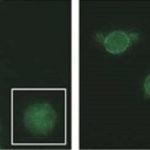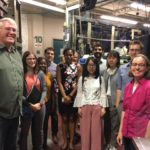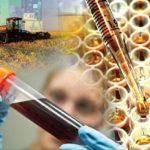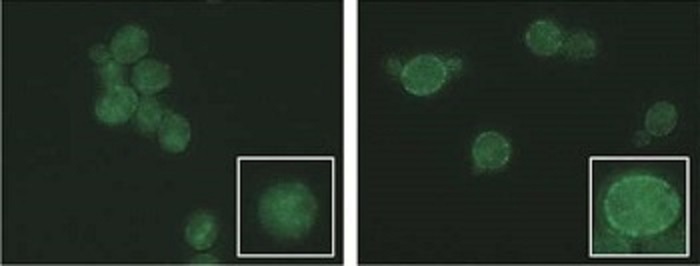 Some chemicals used to speed up the breakdown of plants for production of biofuels like ethanol are poison to the yeasts that turn the plant sugars into fuel. Researchers from the UW-Madison-based Great Lakes Bioenergy Research Center, Joint BioEnergy Institute, and several Department of Energy National Laboratories have identified two changes to a single gene that can make yeast tolerate the pretreatment chemicals. They published their findings recently in the journal Genetics. To learn more read the University of Wisconsin-Madison news release.
Some chemicals used to speed up the breakdown of plants for production of biofuels like ethanol are poison to the yeasts that turn the plant sugars into fuel. Researchers from the UW-Madison-based Great Lakes Bioenergy Research Center, Joint BioEnergy Institute, and several Department of Energy National Laboratories have identified two changes to a single gene that can make yeast tolerate the pretreatment chemicals. They published their findings recently in the journal Genetics. To learn more read the University of Wisconsin-Madison news release.
Congratulations to Biosciences Area Director’s Award Recipients
Purdue Students Tour ALS
Corie Ralston, head of the Berkeley Center for Structural Biology and deputy director of the Molecular Biophysics and Integrated Bioimaging (MBIB) Division, and Mike Martin, Photon Science Operations Group Lead at the Advanced Light Source (ALS), led a tour of the ALS for a group of visiting biomedical engineering graduate students from Purdue University. Tammy Siemers, professional development and external relations specialist at Purdue University, arranges yearly ‘career immersion’ tours of companies and other places where graduate students might end up working one day. “The reason I chose ALS (and Lawrence Berkeley National Laboratory in general) is that I knew they were doing research in areas that our students would be interested in,“ said Siemers. “We had a great visit to ALS.”
The tours–which have taken place in Washington, DC, Boston, and Seattle previously–are important for the students to meet scientists and learn more about their options after graduate school. “I also like for students to gain networking skills and to learn about valuable resources and potential collaborations on this tour,” Siemers added. “ALS definitely has some valuable resources for research that we weren’t even aware of prior to this trip.”
Biosciences and Energy Sciences Areas Host Biomaterials Workshop
On July 16-17, Biosciences, along with the Energy Sciences Area, hosted an internal workshop to discuss and identify paths forward for biomaterials research at Berkeley Lab and in larger contexts–across the national laboratory complex, at universities, and in the private sector– that would enable the creation of new materials with performance-advantaged properties. This workshop continues the program development efforts established through the recent Advanced Biogenic Chemicals and Materials Laboratory-Directed Research and Development initiative established at Berkeley Lab in 2017.
Do Bacteria Ever Go Extinct? New Research Says Yes
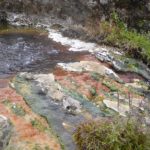 Patrick Shih, Director of Plant Biosystems Design at the Joint BioEnergy Institute (JBEI) and faculty scientist with the Environmental Genomics & Systems Biology (EGSB) Division, collaborated with a team of researchers led by the University of British Columbia in a new study that has found that bacteria go extinct at substantial rates, although appear to avoid the mass extinctions that have hit larger forms of life on Earth. The finding contradicts widely held scientific thinking that microbe taxa, because of their very large populations, rarely die off. The study “Bacterial diversification through geological time,” published today in Nature Ecology and Evolution used massive DNA sequencing and big data analysis to create the first evolutionary tree encompassing a large fraction of Earth’s bacteria over the past billion years. To learn more read the University of British Columbia news release.
Patrick Shih, Director of Plant Biosystems Design at the Joint BioEnergy Institute (JBEI) and faculty scientist with the Environmental Genomics & Systems Biology (EGSB) Division, collaborated with a team of researchers led by the University of British Columbia in a new study that has found that bacteria go extinct at substantial rates, although appear to avoid the mass extinctions that have hit larger forms of life on Earth. The finding contradicts widely held scientific thinking that microbe taxa, because of their very large populations, rarely die off. The study “Bacterial diversification through geological time,” published today in Nature Ecology and Evolution used massive DNA sequencing and big data analysis to create the first evolutionary tree encompassing a large fraction of Earth’s bacteria over the past billion years. To learn more read the University of British Columbia news release.
- « Previous Page
- 1
- …
- 115
- 116
- 117
- 118
- 119
- …
- 213
- Next Page »
Was this page useful?


